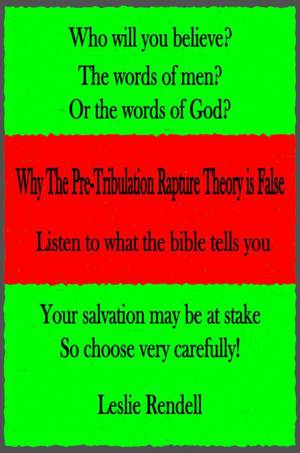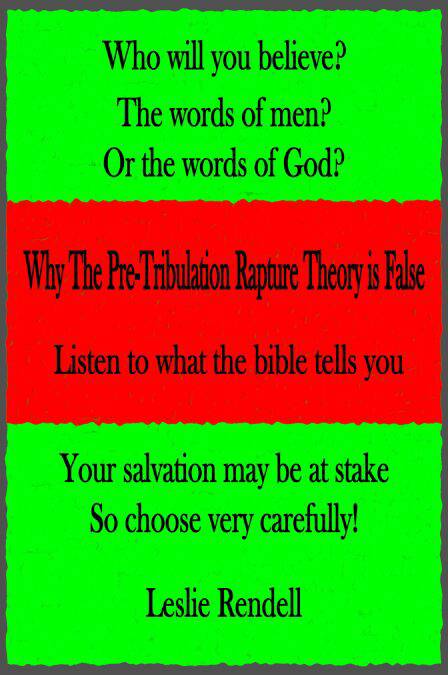
- Retrait gratuit dans votre magasin Club
- 7.000.000 titres dans notre catalogue
- Payer en toute sécurité
- Toujours un magasin près de chez vous
- Retrait gratuit dans votre magasin Club
- 7.000.0000 titres dans notre catalogue
- Payer en toute sécurité
- Toujours un magasin près de chez vous
Description
The doctrine of the pre-tribulation rapture, which asserts that Christians will be removed from the earth before a period of intense tribulation, has gained widespread popularity in modern Christian teaching. This view promises believers an escape from suffering and paints a picture of Christ's return as imminent, occurring without any preceding signs or warnings. However, when examined in light of Scripture, particularly Jesus' discourse in Matthew 24, the doctrine of an imminent pre-tribulation rapture proves to be inconsistent with biblical teaching.
In Matthew 24, often referred to as the Olivet Discourse, Jesus provides His disciples with a detailed explanation of events that will unfold before His return and the end of the age. This chapter is pivotal for understanding the sequence of end-time events, as it comes directly from Christ Himself. Rather than describing an unannounced rapture before the tribulation, Jesus outlines a series of significant signs, warnings, and trials that His followers will experience prior to His return.
Jesus begins by cautioning against deception: "Take heed that no one deceives you. For many will come in My name, saying, 'I am the Christ,' and will deceive many" (Matthew 24:4–5). This warning establishes that believers are to remain vigilant and discerning in a world increasingly filled with false teachings and spiritual confusion. Far from suggesting an imminent and signless event, Jesus encourages His followers to recognize the times and be prepared for what lies ahead.
He goes on to describe wars, famines, earthquakes, and other catastrophic events as "the beginning of sorrows" (Matthew 24:8). These events, while alarming, are not the culmination of God's plan but precursors to the greater tribulation to come. Jesus further predicts persecution for His followers, stating, "Then they will deliver you up to tribulation and kill you, and you will be hated by all nations for My name's sake" (Matthew 24:9). This clear reference to the suffering of believers during the tribulation challenges the notion that Christians will be removed before these trials occur.
The chapter culminates in the climactic arrival of the Son of Man, described as a visible, public event: "Immediately after the tribulation of those days... they will see the Son of Man coming on the clouds of heaven with power and great glory" (Matthew 24:29–30). This statement explicitly links Christ's return with events following the tribulation, not before. Jesus' teaching makes no provision for a secret, pre-tribulation rapture but instead emphasizes the endurance and faithfulness of His followers during this period of trial.
The pre-tribulation rapture teaching, while comforting in its promise of deliverance from suffering, does not align with the scriptural narrative presented in Matthew 24. This chapter paints a picture of believers enduring and overcoming tribulation through God's grace, remaining faithful until Christ's glorious return. By understanding this passage in its proper context, Christians can cultivate a faith that is resilient, prepared, and anchored in the promises of God, rather than relying on an expectation of escape from trials.
This book seeks to explore why the imminence of the pre-tribulation rapture is a false teaching, using Matthew 24 as a foundation for understanding the biblical perspective on Christ's return. Through careful exegesis and comparison with other relevant passages, we will examine the sequence of end-time events, the role of believers during the tribulation, and the hope that comes from trusting in God's plan. In doing so, we aim to provide clarity and encouragement for believers, helping them to stand firm in their faith as they await the glorious return of the Son of Man.
Spécifications
Parties prenantes
- Auteur(s) :
- Editeur:
Contenu
- Langue:
- Anglais
- Collection :
Caractéristiques
- EAN:
- 9798224880355
- Date de parution :
- 15-01-24
- Format:
- Ebook
- Protection digitale:
- /
- Format numérique:
- ePub

Les avis
Nous publions uniquement les avis qui respectent les conditions requises. Consultez nos conditions pour les avis.






